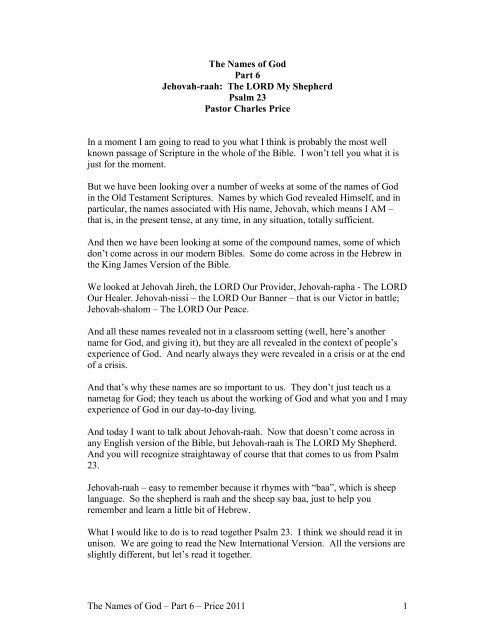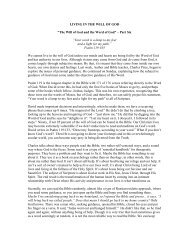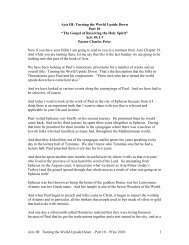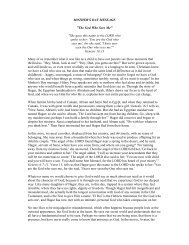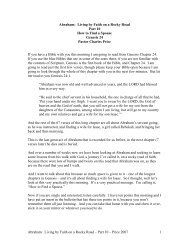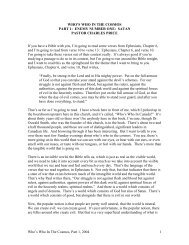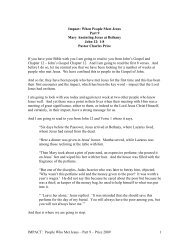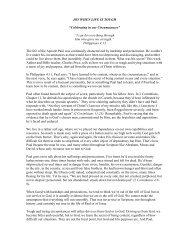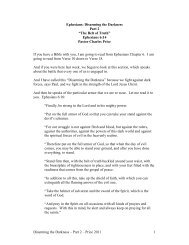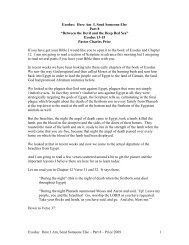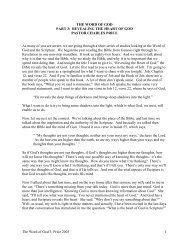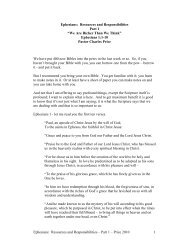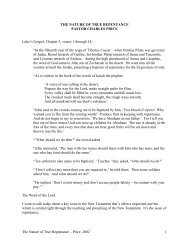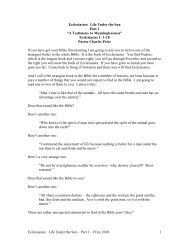The Names of God â Part 6 - Living Truth
The Names of God â Part 6 - Living Truth
The Names of God â Part 6 - Living Truth
Create successful ePaper yourself
Turn your PDF publications into a flip-book with our unique Google optimized e-Paper software.
<strong>The</strong> <strong>Names</strong> <strong>of</strong> <strong>God</strong><br />
<strong>Part</strong> 6<br />
Jehovah-raah: <strong>The</strong> LORD My Shepherd<br />
Psalm 23<br />
Pastor Charles Price<br />
In a moment I am going to read to you what I think is probably the most well<br />
known passage <strong>of</strong> Scripture in the whole <strong>of</strong> the Bible. I won’t tell you what it is<br />
just for the moment.<br />
But we have been looking over a number <strong>of</strong> weeks at some <strong>of</strong> the names <strong>of</strong> <strong>God</strong><br />
in the Old Testament Scriptures. <strong>Names</strong> by which <strong>God</strong> revealed Himself, and in<br />
particular, the names associated with His name, Jehovah, which means I AM –<br />
that is, in the present tense, at any time, in any situation, totally sufficient.<br />
And then we have been looking at some <strong>of</strong> the compound names, some <strong>of</strong> which<br />
don’t come across in our modern Bibles. Some do come across in the Hebrew in<br />
the King James Version <strong>of</strong> the Bible.<br />
We looked at Jehovah Jireh, the LORD Our Provider, Jehovah-rapha - <strong>The</strong> LORD<br />
Our Healer. Jehovah-nissi – the LORD Our Banner – that is our Victor in battle;<br />
Jehovah-shalom – <strong>The</strong> LORD Our Peace.<br />
And all these names revealed not in a classroom setting (well, here’s another<br />
name for <strong>God</strong>, and giving it), but they are all revealed in the context <strong>of</strong> people’s<br />
experience <strong>of</strong> <strong>God</strong>. And nearly always they were revealed in a crisis or at the end<br />
<strong>of</strong> a crisis.<br />
And that’s why these names are so important to us. <strong>The</strong>y don’t just teach us a<br />
nametag for <strong>God</strong>; they teach us about the working <strong>of</strong> <strong>God</strong> and what you and I may<br />
experience <strong>of</strong> <strong>God</strong> in our day-to-day living.<br />
And today I want to talk about Jehovah-raah. Now that doesn’t come across in<br />
any English version <strong>of</strong> the Bible, but Jehovah-raah is <strong>The</strong> LORD My Shepherd.<br />
And you will recognize straightaway <strong>of</strong> course that that comes to us from Psalm<br />
23.<br />
Jehovah-raah – easy to remember because it rhymes with “baa”, which is sheep<br />
language. So the shepherd is raah and the sheep say baa, just to help you<br />
remember and learn a little bit <strong>of</strong> Hebrew.<br />
What I would like to do is to read together Psalm 23. I think we should read it in<br />
unison. We are going to read the New International Version. All the versions are<br />
slightly different, but let’s read it together.<br />
<strong>The</strong> <strong>Names</strong> <strong>of</strong> <strong>God</strong> – <strong>Part</strong> 6 – Price 2011 1
“<strong>The</strong> LORD is my shepherd, I shall not be in want.<br />
“He makes me lie down in green pastures, he leads me beside quiet<br />
waters, he restores my soul. He guides me in paths <strong>of</strong> righteousness for<br />
his name’s sake.<br />
“Even though I walk through the valley <strong>of</strong> the shadow <strong>of</strong> death, I will fear<br />
no evil, for you are with me; your rod and your staff, they comfort me.<br />
“You prepare a table before me in the presence <strong>of</strong> my enemies. You<br />
anoint my head with oil; my cup overflows.<br />
“Surely goodness and love will follow me all the days <strong>of</strong> my life, and I<br />
will dwell in the house <strong>of</strong> the LORD forever.”<br />
Well I don’t know how much you know about sheep, but, if you have lived in an<br />
urban setting most <strong>of</strong> your life or all <strong>of</strong> your life, you probably don’t know very<br />
much.<br />
I grew up in rural setting and I have lived in a rural setting and I have grown up<br />
on a farm and so I actually know quite a bit about sheep.<br />
And if you ask a person, “What do you know about sheep?” probably the first<br />
thing they would say is, “Well, sheep are stupid.”<br />
That’s the unfortunate reputation that they have, probably due to their strong<br />
flocking instinct where, instead <strong>of</strong> acting independently, they follow the first<br />
sheep out in whatever direction it might be going.<br />
And you remember, in the Old Testament Scripture it says, “All we like sheep<br />
have gone astray.” You know, we follow after those who lead us down difficult<br />
paths.<br />
But actually it’s quite a smart move because it’s designed to protect them from<br />
predators. And when they are fearful in any way they come together and they<br />
move together as a flock <strong>of</strong> sheep, which helps them prepare themselves, rather<br />
than acting independently.<br />
But there is increasing evidence that actually sheep might be a lot more intelligent<br />
than we thought they were. That has been some research going on – I can’t, for<br />
the life <strong>of</strong> me, think why people are researching the intelligence <strong>of</strong> sheep, but<br />
apparently they are.<br />
And I found a website that told me some things. It says that a study has found<br />
that sheep can remember the faces <strong>of</strong> more than 50 other sheep for up to two<br />
years.<br />
<strong>The</strong> <strong>Names</strong> <strong>of</strong> <strong>God</strong> – <strong>Part</strong> 6 – Price 2011 2
So if they meet a sheep they haven’t seen for 18 months on the road, they just say,<br />
“Baa” and they reply, “Baa” and move on. But they recognize each other<br />
apparently.<br />
<strong>The</strong>y also recognize a familiar human face. And the journal “Nature”, it is called,<br />
suggests that they may be nearly as good as people at distinguishing faces in the<br />
crowd.<br />
I couldn’t help but thinking, well, well done, this research, whoever spent money<br />
and time on this. If they had read John Chapter 10, when Jesus talked about sheep<br />
2,000 years ago, they would have found something similar to that. Because<br />
talking about being the Good Shepherd, Jesus said that the Good Shepherd<br />
“…calls his own sheep by name and leads them out. When he has brought<br />
out all his own, he goes on ahead <strong>of</strong> them, and his sheep follow him<br />
because they know his voice.<br />
“But they will never follow a stranger; in fact they will run away from a<br />
stranger because they do not recognize his voice.”<br />
So all this up to date research just tells us what Jesus said 2,000 years ago<br />
anyway.<br />
But they also say that sheep can form individual relationships with one another –<br />
friendship in fact – that can last for a few weeks (like the friendships some <strong>of</strong> us<br />
have, I am sure).<br />
It is even possible that they might think about a face even when it is not there.<br />
And the research has also found that female sheep had a definite opinion about<br />
what made a ram’s face attractive. So there you are.<br />
But actually BBC reported just a while ago that in the north <strong>of</strong> England on the<br />
Yorkshire Moors where there are a lot <strong>of</strong> sheep, there was a beautiful garden,<br />
which had a cattle grid to protect animals getting into it – a cattle grid was on the<br />
road. (A cattle grid is a series <strong>of</strong> bars – any animal trying to walk across it will<br />
fall down between the bars.)<br />
And they noticed some sheep standing around at the entrance, as sheep <strong>of</strong>ten do.<br />
Our house was in a field and we had to go down a drive to it and we had a cattle<br />
grid and we had sheep in the field and they <strong>of</strong>ten would stand around and look at<br />
it.<br />
But what happened, according to the BBC, is that one day one <strong>of</strong> these sheep lay<br />
down and rolled over the cattle grid, got up on his feet on the other side. <strong>The</strong> next<br />
<strong>The</strong> <strong>Names</strong> <strong>of</strong> <strong>God</strong> – <strong>Part</strong> 6 – Price 2011 3
one followed and when somebody came out, there was all this flock <strong>of</strong> sheep in<br />
their garden.<br />
Now that’s pretty smart, don’t you think?<br />
So sheep are a little more intelligent than we <strong>of</strong>ten give them credit for.<br />
Now this psalm is a psalm spoken by a sheep, from a sheep’s perspective. We<br />
sometimes call it the Shepherd’s Psalm; it’s really the Sheep Psalm.<br />
He is saying,<br />
“<strong>The</strong> LORD is my shepherd. I shall not want.”<br />
And then it’s I, Me, personal pronoun all the way down through the psalm,<br />
speaking on behalf <strong>of</strong> the sheep.<br />
And I want to build what I talk to you about this morning around three things that<br />
the sheep says about itself. And these are three things that you and I will be able<br />
to say about ourselves when we are living in a wholesome relationship with the<br />
Lord as my Shepherd.<br />
<strong>The</strong> first thing he says is<br />
“I shall not be in want.”<br />
That’s a great thing to say.<br />
Second thing: Verse 4:<br />
“I shall fear no evil.”<br />
And the third thing, in Verse 6:<br />
“I will dwell in the house <strong>of</strong> the LORD forever.”<br />
Now this makes three easy divisions for us this morning. So now I am going to<br />
talk about these one by one and see how the other verses in the psalm amplify and<br />
explain these statements.<br />
First <strong>of</strong> all:<br />
“I shall not be in want.”<br />
What he is saying is, “<strong>The</strong>re is adequate provision for me when the Lord is my<br />
shepherd.”<br />
<strong>The</strong> <strong>Names</strong> <strong>of</strong> <strong>God</strong> – <strong>Part</strong> 6 – Price 2011 4
I looked up a number <strong>of</strong> different translations to see ways in which they express<br />
this. <strong>The</strong> King James, which many <strong>of</strong> you will be familiar with by memory, says,<br />
“I shall not want.”<br />
<strong>The</strong> Amplified Bible says,<br />
“<strong>The</strong> LORD is my shepherd, I shall not lack.”<br />
<strong>The</strong> contemporary English Bible says,<br />
“You LORD are my shepherd, I will never be in need.”<br />
Another translation says,<br />
“<strong>The</strong> LORD ruleth me and I shall want nothing.”<br />
Another one says,<br />
“Jehovah is my shepherd, I do not lack.”<br />
<strong>The</strong> Message says,<br />
“<strong>God</strong>, my shepherd, I don’t need a thing.”<br />
And one that I love, which my assistant Maggie Millwood gave me – it’s actually<br />
from a hymn but it is a great statement based on this verse:<br />
I love that.<br />
“<strong>The</strong> LORD my shepherd guards me well.”<br />
“<strong>The</strong> LORD my shepherd guards me well.”<br />
What does it mean to not want, to not be in want?<br />
You know contentment is not simply the result <strong>of</strong> an environment that is<br />
comfortable and sufficient. Contentment is an attitude and disposition <strong>of</strong> mind.<br />
It is possible to have everything that seems right around us and yet to be<br />
discontented and it’s possible to have everything around us falling apart and to be<br />
content.<br />
And I will give you two examples <strong>of</strong> that from the Scripture. One example is Eve<br />
in the Garden <strong>of</strong> Eden, where literally everything in the Garden was lovely. <strong>The</strong><br />
<strong>The</strong> <strong>Names</strong> <strong>of</strong> <strong>God</strong> – <strong>Part</strong> 6 – Price 2011 5
environment was beautiful. <strong>The</strong> food was okay. <strong>The</strong> husband was fine. <strong>The</strong><br />
purpose for their lives was clear to them. And they had everything they needed in<br />
the Garden <strong>of</strong> Eden.<br />
But it is never enough if your heart is not satisfied. And when the devil dangled<br />
in front <strong>of</strong> her this fruit she was forbidden to eat and she saw that it was good for<br />
food and would make her wise, would give her something she thought she hadn’t<br />
got because this is what the devil told her, she took <strong>of</strong> it and ate and fell into a<br />
mess.<br />
On the other hand, when Paul, the apostle, wrote to the Philippians, writing from<br />
prison, he said to them in Philippians 4:12,<br />
“I have learned the secret <strong>of</strong> being content in any and every situation,<br />
whether well fed or hungry, whether living in plenty or in want.”<br />
He said, “I have learned the secret that it has nothing to do with my<br />
circumstances. It is a secret <strong>of</strong> a disposition <strong>of</strong> heart that leaves me content.”<br />
You see to not want is a choice. And I will tell you why we need to make that<br />
choice: because all the time we are bombarded with ideas that what we have is<br />
not enough.<br />
All <strong>of</strong> advertising is designed to make you dissatisfied and then to want what it is<br />
that they are <strong>of</strong>fering you.<br />
And so this position <strong>of</strong> “I shall not want” somehow – and we’ll try to see how –<br />
works out <strong>of</strong> really knowing that the Lord is my shepherd – Jehovah-raah.<br />
David goes on to explain ways in which he does not want. <strong>The</strong>re are four ways – I<br />
am going to give them to you.<br />
First <strong>of</strong> all, materially - Verse 2:<br />
“He makes me lie down in green pastures.”<br />
Now I have lived around sheep for many years <strong>of</strong> my life. And as I mentioned,<br />
the house we lived in, in England before we came here, we were there for 20<br />
years in that house in the middle <strong>of</strong> a field. We had sheep in the field.<br />
<strong>The</strong> only way to make a sheep lie down is to satisfy its stomach. And when a<br />
sheep is not hungry it lies down. That’s the only situation.<br />
David knew this. David was a shepherd. He may have written this as a young<br />
man when still a shepherd. And he had seen his sheep lie down. “Okay, the<br />
shepherd would say, “I can relax now; they are satisfied.”<br />
<strong>The</strong> <strong>Names</strong> <strong>of</strong> <strong>God</strong> – <strong>Part</strong> 6 – Price 2011 6
“<strong>The</strong> LORD is my shepherd. I shall not want.”<br />
Why?<br />
“He makes me lie down in green pastures.”<br />
And they are green pastures. When I farmed in Zimbabwe for several years when<br />
I was younger, it didn’t rain for 8 months <strong>of</strong> the year. It started to rain in October,<br />
preferably, sometimes November; run through till February or January. And<br />
maybe two or three days a week it would rain. You hoped it would – and rain<br />
heavily.<br />
But for 8 months <strong>of</strong> the year it was just blue sky every day and all the vegetation<br />
would dry up and become this golden browny color.<br />
And we had a lot <strong>of</strong> sheep and we had shepherds who looked after these sheep all<br />
day. But we would irrigate an area <strong>of</strong> fresh grass – a big paddock <strong>of</strong> fresh grass.<br />
And irrigate it for a few days – it would become rich and lush. And by this time<br />
the sheep have grazed down the area they have been in for a little while. And we<br />
would move them from one to the other.<br />
And I remember one day seeing the shepherds moving these sheep along the path<br />
that went to the newly irrigated lush green pasture. And as the sheep came to a<br />
certain point, they could see the beautiful green grass in the distance and they<br />
would begin to run.<br />
And before long the sheep were running, creating a big dust, getting into that<br />
paddock, grazing and lying down when they were satisfied.<br />
But the point is “he makes me lie down in green pastures - he provides what I<br />
need.”<br />
Now Jesus encouraged us to pray, “Give us this day our daily bread.”<br />
He did not encourage us to pray, “Give us today enough bread to last the month or<br />
the year”, but to live in day-by-day trust and dependence.<br />
And you know, David wrote this as a young man, but he wrote Psalm 37 as an old<br />
man.<br />
And in Psalm 37:25 he said this:<br />
“I was young and now I am old, yet I have never seen the righteous<br />
forsaken or their children begging bread.”<br />
<strong>The</strong> <strong>Names</strong> <strong>of</strong> <strong>God</strong> – <strong>Part</strong> 6 – Price 2011 7
And the reason why he wrote that statement then was because if you look at<br />
Psalm 37, he is discussing in that psalm, why is it that the wicked seem to<br />
prosper? Why is it that the people who act evil seem to get away with it? Why is<br />
it that the good people <strong>of</strong>ten seem to get into trouble?<br />
And that is a very real dilemma. It is addressed several times in Scripture. He<br />
addresses it in Psalm 37, but at the end he says this: “I was young; now I am old<br />
and I will tell you this: I have never seen the righteous forsaken or his children<br />
begging bread.”<br />
When it comes to what we need, the Lord is a good shepherd.<br />
And then secondly, he talks about his provision emotionally.<br />
“He leads me beside quiet waters.”<br />
Or some translations say,<br />
“He leads me beside still waters.”<br />
Waters have a calming and soothing effect. That’s why a lot <strong>of</strong> people have<br />
cottages next to lakes because that’s where you go to unwind and find the<br />
soothing effect <strong>of</strong> the water.<br />
Nobody says, “I have got a cottage in the middle <strong>of</strong> the city.” You want to get<br />
away and you want to get by the water.<br />
And still waters are deep waters. Shallow water is fast moving. So these are deep<br />
waters. And he says, “He leads me beside these deep waters where I can – he’s<br />
using picture language here <strong>of</strong> taking time to renew and to find peace in the<br />
stillness and the depths <strong>of</strong> being alone and being alone with <strong>God</strong>.<br />
Later in the Psalms it says in Psalm 46:10,<br />
“Be still and know that I am <strong>God</strong>.”<br />
You know one <strong>of</strong> the biggest – I think – one <strong>of</strong> the biggest dangers in our culture<br />
today is the noise pollution, if I can call it that that we constantly expose ourselves<br />
to.<br />
We are never without noise, never without music. You see people jogging, you<br />
know, and they have got their iPod or MP3 and they are listening.<br />
We get in the car and the radio goes on straightaway or the iPod goes in or<br />
whatever it is. We get home; we switch on the television or we put on the music.<br />
And we are hardly ever – for many <strong>of</strong> us – just quiet, just time to think and<br />
<strong>The</strong> <strong>Names</strong> <strong>of</strong> <strong>God</strong> – <strong>Part</strong> 6 – Price 2011 8
meditate. In fact some <strong>of</strong> us don’t know what to do with silence – we’re scared <strong>of</strong><br />
it.<br />
“He leads me beside still waters.”<br />
Thirdly, spiritually – he says in Verse 3,<br />
“He restores my soul.”<br />
Our needs are not just physical, but spiritual. And he talks about restoring the<br />
soul, renewing the soul.<br />
Later again in Psalms and I tried to find some other statements in Psalms that<br />
undergird some <strong>of</strong> these statements here in Psalm 23. But Psalm 62:1,<br />
“My soul finds rest in <strong>God</strong> alone.”<br />
<strong>The</strong>re is a rest; there is an intimacy that comes from being with <strong>God</strong> alone. And<br />
He restores my soul. We need the refreshment and the restoration <strong>of</strong> soul that<br />
comes from spending time alone with <strong>God</strong>.<br />
And fourthly here, under this “I shall not want”, he talks about morally,<br />
“He guides me in the paths <strong>of</strong> righteousness for his name’s sake.”<br />
If we are in step with the shepherd, we are led along paths <strong>of</strong> righteousness – that<br />
is, we love what is right and we do what is right and we live in a way that is right.<br />
And if you are discerning the will <strong>of</strong> <strong>God</strong> but going down a road that involves<br />
unrighteousness, I can tell you this: you are out <strong>of</strong> the will <strong>of</strong> <strong>God</strong>, because He<br />
leads me in paths that are morally righteous. He is talking here about our<br />
behaviour and the way we live.<br />
And do you know why He does that? It’s for His name’s sake. Now that changes<br />
the focus, doesn’t it? Because <strong>of</strong>ten we say, “Well, is this going to advantage<br />
me?” Because there are some times when unrighteousness is to my advantage –<br />
cheating a little bit – not quite being honest with the truth. That’s to my<br />
advantage.<br />
No, it’s not about “for our name’s sake”; it’s for “His name’s sake.” For keeping<br />
in such a wholesome relationship with the shepherd that as we live that way we<br />
can say Jehovah-raah – the Lord is my shepherd, I shall not want. I will not lack,<br />
and I have enough.<br />
Can you say with a good conscience this morning “I shall not want?” Or is there<br />
under the surface driving you some aspiration which is not satisfied in letting the<br />
<strong>The</strong> <strong>Names</strong> <strong>of</strong> <strong>God</strong> – <strong>Part</strong> 6 – Price 2011 9
Lord be your shepherd, which means He will guide you and lead you and put you<br />
in the right place, because that’s what shepherds do for their sheep?<br />
<strong>The</strong> second thing that he says is,<br />
“I shall fear no evil.”<br />
If to say “I shall not be in want” is to talk about adequate provision, to say “I shall<br />
fear no evil” is to talk about adequate protection that is given me by the shepherd.<br />
And here are three areas in which we may not fear. We need not fear death,<br />
“Even though I walk through the valley <strong>of</strong> the shadow <strong>of</strong> death, I will fear<br />
no evil, for you are with me.”<br />
He talks about death and fear in the same sentence there and <strong>of</strong>ten those two<br />
things do belong in the same sentence for a lot <strong>of</strong> people. A lot <strong>of</strong> us fear death or<br />
we fear dying, or we fear both.<br />
But actually, though these two words are in the same sentence – death and fear –<br />
he is separating them by saying,<br />
“Though I walk through the valley <strong>of</strong> the shadow <strong>of</strong> death…”<br />
<strong>The</strong>re is death – I am going to go through death – that is the only certain thing<br />
about life is that it will end physically in death. But, “though I walk through the<br />
valley <strong>of</strong> the shadow <strong>of</strong> death, I will fear no evil.”<br />
So he takes hold <strong>of</strong> evil and he gets hold <strong>of</strong> death and he says, “<strong>The</strong>se two are no<br />
longer married together where death leads to fear.”<br />
<strong>The</strong>re is death but there is no fear – he separates them.<br />
And do you know why he does that? Because he describes death as “the valley <strong>of</strong><br />
the shadow <strong>of</strong> death”. Death, though real, is reduced to a shadow.<br />
And remember this: if you see the shadow <strong>of</strong> a stick on the wall, it will never hit<br />
you. <strong>The</strong> shadow <strong>of</strong> a dog will never bite you. <strong>The</strong> shadow <strong>of</strong> a truck coming<br />
down the sidewalk will never run you down. And the shadow <strong>of</strong> death will never<br />
kill you. It is reduced to a shadow. You go through it but you come out the other<br />
side alive.<br />
And as somebody said to me about 45 minutes ago, death becomes a shadow<br />
when you put a light on it. Shadows are only there when there is light. And you<br />
see we have a totally different understanding <strong>of</strong> death now. This physical life will<br />
<strong>The</strong> <strong>Names</strong> <strong>of</strong> <strong>God</strong> – <strong>Part</strong> 6 – Price 2011 10
come to an end but to be absent from this body is to be present with the Lord,<br />
Paul wrote in the New Testament.<br />
John Stott once wrote this:<br />
“One <strong>of</strong> the most searching tests to apply to any religion concerns its<br />
attitude to death. And measured by this test, much <strong>of</strong> so-called<br />
Christianity is found wanting in its black clothes, its mournful chants, its<br />
requiem masses. Of course dying can be very unpleasant and<br />
bereavement can bring bitter sorrow, but death itself has been<br />
overthrown.”<br />
And he quotes Revelation 14:13:<br />
“Blessed are the dead who die in the Lord.”<br />
“<strong>The</strong> proper epitaph,” writes Stott “to write for a Christian believer is not<br />
a dismal and uncertain RIP (which means Rest In Peace), but a joyful and<br />
certain affirmation CAD (Christ Abolished Death).”<br />
And Hilary and I were able to attend the funeral <strong>of</strong> John Stott in London a few<br />
months ago. We were in England at the time. We arrived that morning,<br />
coincidentally, and we attended his funeral. And it was a celebration <strong>of</strong> a life that<br />
trusted <strong>God</strong> and was unafraid <strong>of</strong> death.<br />
I know there are natural fears about death. <strong>The</strong>re are natural fears about the<br />
things we don’t know about death and the process <strong>of</strong> dying. But it is only a<br />
shadow – it’s only a shadow.<br />
And those who know the Lord as their shepherd, who are in such relationship<br />
with Him that they have received that gift <strong>of</strong> eternal life, we pass through the<br />
shadow; we come out the other side alive forever.<br />
So he says, “I shall not fear. I shall not fear death.”<br />
Secondly he says, also in Verse 4, “I shall not fear discipline” because he writes,<br />
“Your rod and staff, they comfort me.”<br />
Now the rod and the staff are the basic tools <strong>of</strong> the shepherd. <strong>The</strong>y were two<br />
things with which he provided protection on the one hand and correction on the<br />
other hand.<br />
So when marauding animals came along, the shepherd would whack them with<br />
his rod to drive them away. And when a wandering sheep fell over the cliff, he<br />
would pull it back to safety with his staff, which had a hook on the head <strong>of</strong> it,<br />
<strong>The</strong> <strong>Names</strong> <strong>of</strong> <strong>God</strong> – <strong>Part</strong> 6 – Price 2011 11
which you could reach down around the ankle <strong>of</strong> the sheep and pull it back.<br />
That’s how you catch a sheep, normally, if you are going to do something with it.<br />
When the sheep needed a poke, they would get it from the staff or the rod. And<br />
he says that this poking and prodding and whacking that goes on with the<br />
shepherd’s rod and staff is a comfort to me.<br />
It’s comforting to know we have a shepherd who will protect us and a shepherd<br />
who will correct us, who will poke us when we need poking and prod us when we<br />
need prodding and even whack us when we need whacking (which we do from<br />
time to time).<br />
You know, in a family it’s very comforting to have parents who will protect you<br />
and correct you. It’s not always pleasant at the time. <strong>The</strong> writer to the Hebrews<br />
writes that in Hebrews 12:5,<br />
“Have you forgotten that word <strong>of</strong> encouragement that addresses you as<br />
sons: ‘My son, do not make light <strong>of</strong> the Lord’s discipline, and do not lose<br />
heart when he rebukes you, because the Lord disciplines those he loves,<br />
and he punishes everyone he accepts as a son.’”<br />
I love the fact that this is a word <strong>of</strong> encouragement that the Lord disciplines you.<br />
Why? Because He loves you and because you need protecting, you need<br />
correcting.<br />
And the discipline <strong>of</strong> <strong>God</strong> is encouraging.<br />
“Your rod, your staff, they comfort me.”<br />
I made a comment a week or two ago that <strong>God</strong> doesn’t judge us in this life, that<br />
there is going to be a day which He has set, by which He will judge the world.<br />
But He does discipline us; He does correct us. And that’s because He is a loving<br />
father and because He is a good shepherd.<br />
And the third thing here on not being afraid is that you will not fear dissension or<br />
conflict.<br />
“You prepare a table before me in the presence <strong>of</strong> my enemies. You<br />
anoint my head with oil; my cup overflows.”<br />
We talked about no fear in death and no fear in discipline. Now there is no fear in<br />
defiance or dissension or conflict, battle. <strong>The</strong>re are two things in this verse –<br />
there is a feast (You prepare a table before me) and there is a fight – where is the<br />
table? In the presence <strong>of</strong> my enemies.<br />
<strong>The</strong> <strong>Names</strong> <strong>of</strong> <strong>God</strong> – <strong>Part</strong> 6 – Price 2011 12
Now if you want to get <strong>of</strong>f balance, just see it as all fight or just see it as all feast.<br />
It is both. We enjoy the feast – that is the provision that He makes available to us.<br />
And He makes it so fully available to us that he says, “my cup overflows”.<br />
“My cup overflows – there is plenty.” <strong>The</strong> provision I need to rest in His<br />
provision – there is a feast.<br />
But there is also a fight; there is a battle. And we are in conflict – we are in<br />
conflict with principalities and powers that are outside <strong>of</strong> the physical world but<br />
operate within our physical world. We fight against the world, the flesh and the<br />
devil, is what the Scripture tells us.<br />
<strong>The</strong> principle <strong>of</strong> the world, which is <strong>God</strong>-less and it’s all about myself, because he<br />
explains it in that passage in 1 John. It’s about the lust <strong>of</strong> the flesh, the lust <strong>of</strong> the<br />
eyes, the pride <strong>of</strong> life. We fight against the world, against the flesh, the old nature<br />
that loves to do its own thing, loves the dirt, and against the devil and his cohorts<br />
who fight against us.<br />
You know, part way through Jesus’ ministry He sent His disciples out on their<br />
own. He had not done that before. And He told them four times in Matthew 10<br />
when He sent them out, “Do not be afraid. Do not be afraid. Do not be afraid.<br />
Do no be afraid.”<br />
<strong>The</strong>y probably thought, “Well, what’s there to be afraid <strong>of</strong> you know? “This is<br />
exciting.”<br />
“He said, ‘I am going to send you out to preach the kingdom <strong>of</strong> <strong>God</strong> is near, heal<br />
the sick, raise the dead.’ He is going to empower them to do these things. Wow,<br />
that’s fantastic! Why are You talking about “Don’t be afraid, don’t be afraid,<br />
don’t be afraid?”<br />
Well then He says to them this:<br />
“I am sending you out like sheep among wolves.” [Matt. 10:16]<br />
<strong>The</strong>y probably said, “I beg Your pardon?”<br />
I mean what happens when sheep and wolves meet? Well the wolves have a<br />
picnic don’t they? Do the wolves roll over on their backs and the sheep tickle<br />
their tummies? No, when wolves and sheep meet, the wolves have fun and eat the<br />
sheep.<br />
I can imagine Jesus saying, you know, “Peter, James, John, I am sending you<br />
out.”<br />
<strong>The</strong> <strong>Names</strong> <strong>of</strong> <strong>God</strong> – <strong>Part</strong> 6 – Price 2011 13
“Hallelujah. We’re ready; we’ve ready. Hey You told us this was going to<br />
happen.”<br />
“Let me finish the sentence. I send you out like sheep amongst wolves.”<br />
“Wolves?”<br />
“Yeah, see those wolves over there?”<br />
“Yes.”<br />
“See their sharp teeth?”<br />
“Yes.”<br />
“I am sending you out to meet the wolves.”<br />
“Help!”<br />
“And don’t get this wrong. You’re the sheep; you’re not the wolf. You are the<br />
vulnerable one.”<br />
But He said, “Don’t be afraid.” And we’re not looking at that whole passage, but<br />
what He said after this was, [Matt. 10:28-31]<br />
“Don’t be afraid <strong>of</strong> those who can kill the body but cannot kill the soul.”<br />
(<strong>The</strong>y can kill the body.)<br />
“Rather, be afraid <strong>of</strong> the One who can destroy both soul and body in hell.<br />
“Are not two sparrows sold for a penny? Yet not one <strong>of</strong> them will fall to<br />
the ground apart from the will <strong>of</strong> your Father.<br />
“And even the very hairs <strong>of</strong> your head are all numbered.<br />
“So don’t be afraid; you are worth more than many sparrows.”<br />
He doesn’t say, “Now, you are not going to have any trouble.” No, He says,<br />
“You know sparrows fall out <strong>of</strong> the nest and die? Well your Father knows about<br />
every sparrow and you are worth more than that, so you may actually, when you<br />
face the wolves, die.<br />
And James, <strong>of</strong> these disciples, was the first to die in Acts Chapter 12. That’s not<br />
very far into the book <strong>of</strong> Acts.<br />
<strong>The</strong> <strong>Names</strong> <strong>of</strong> <strong>God</strong> – <strong>Part</strong> 6 – Price 2011 14
<strong>The</strong>y tell us, in as much as we know with extra biblical information, that only one<br />
<strong>of</strong> those disciples died in his bed as an old man. <strong>The</strong> others were martyred –<br />
Thomas in India, Peter crucified upside down, others we don’t have detail about.<br />
But He says, “Don’t be afraid. Don’t be afraid, because you see, your need to not<br />
fear death and your need to not fear discipline and your need to not fear<br />
dissension and battle and conflict is because “the Lord is my shepherd” and don’t<br />
be afraid – just let Me lead you as a shepherd leads his flock.<br />
But in the midst <strong>of</strong> it, enjoy the feast, the calm peace.<br />
A man came to me at the end <strong>of</strong> the first service this morning. He said, “You<br />
know, this week I was diagnosed as having five tumours in three different parts <strong>of</strong><br />
my body.” He said, “I have had quite a lot <strong>of</strong> pain and when I went this week and<br />
was given the diagnosis, instead <strong>of</strong> panic, I felt a peace.”<br />
He is a middle-aged man – not an old person. He said, “Not only a peace but<br />
when I went home, I almost felt” – he said, “it sounds crazy to say I felt happy<br />
because I don’t think I felt happy, but I felt something inside that was so warm<br />
and real.”<br />
And he said, “Thank you for explaining this morning what I felt, because the Lord<br />
is my shepherd, I shall not fear.”<br />
I wonder where you are in your life and what is going on. <strong>The</strong>se are real issues <strong>of</strong><br />
course and we don’t glibly treat them and glibly respond to them. And yes, we<br />
struggle sometimes, coming to that point <strong>of</strong> having no fear. And we struggle with<br />
surrendering these things. I know that.<br />
But there is adequate protection. “And I shall fear no evil” he says.<br />
And the last thing, the third thing, he says,<br />
“I will dwell in the house <strong>of</strong> the LORD.”<br />
If there is adequate provision and adequate protection, there are adequate<br />
prospects too that I am looking ahead now to the future. And he looks to the<br />
future in two ways.<br />
First <strong>of</strong> all, in the temporal part <strong>of</strong> our life:<br />
“Surely, goodness and love will follow me all the days <strong>of</strong> my life.”<br />
Some translations:<br />
“goodness and mercy” – the word can be translated both ways.<br />
<strong>The</strong> <strong>Names</strong> <strong>of</strong> <strong>God</strong> – <strong>Part</strong> 6 – Price 2011 15
And He says, “This is something I know: surely, that whatever the days <strong>of</strong> my<br />
life involve, be they 20 years or 50 years or 70 years or 90 years, or whatever it is<br />
<strong>God</strong> gives to me, surely these two things are going to follow me: goodness and<br />
love and mercy.”<br />
Shepherds today work with sheepdogs. Sheepdogs get behind the sheep and drive<br />
them. My father used to breed sheepdogs. He even used to exhibit them in<br />
sheepdog trials at one stage, but he gave up in embarrassment after one or two not<br />
good incidents with his sheepdogs.<br />
But he would train them and I would watch him train them. And he would<br />
communicate with these dogs with a whistle. I couldn’t tell the difference<br />
between one whistle and another, but the dog knew one meant go the right; one<br />
meant go to the left; one meant go straight on; one meant go stop; one meant lie<br />
down, etc.<br />
And he would use two dogs as well and each dog knew the signal that was for<br />
him or her and they would drive the sheep. Put up two poles in the middle <strong>of</strong> a<br />
field and they would drive the sheep through the poles. <strong>The</strong> dogs would make<br />
sure that one didn’t go outside the pole – no fence, just two poles – just to make<br />
sure the dogs could do it well. It was great to watch.<br />
<strong>The</strong>re are two sheepdogs that the shepherd sends to round us up and bring us in:<br />
goodness and mercy. <strong>The</strong>se are the two things that are going to follow us.<br />
And these are the two things that we can trust <strong>God</strong> for, that, whatever He does in<br />
our lives, it is good. It may not seem that at the beginning, as we read in that<br />
verse in Hebrews that discipline doesn’t seem good at the beginning, but it yields<br />
its fruit and you look back afterwards and say, “That was good. I am so glad I<br />
went through that.”<br />
Not only His goodness, but His mercy or His love. And we need His mercy; we<br />
need to be forgiven, we know we are going to fail, and His love that keeps<br />
reaffirming and operating within us.<br />
And then the second thing: we have adequate prospects in the temporal but we<br />
have adequate prospects in the eternal for he finishes:<br />
“I will dwell in the house <strong>of</strong> the LORD forever.”<br />
We will pass through the shadow <strong>of</strong> death, but on the other side, there will be<br />
forever a life, as he puts it, “in the house <strong>of</strong> the LORD.”<br />
To be absent from the body is to be present with the Lord. <strong>The</strong>re really is<br />
something greater to come. That is not an escape from the present for the<br />
<strong>The</strong> <strong>Names</strong> <strong>of</strong> <strong>God</strong> – <strong>Part</strong> 6 – Price 2011 16
Scripture equips us to live in the present but to know that there is going to come<br />
something even greater that the mind cannot comprehend, because it is beyond<br />
anything we know in this life.<br />
No wonder David wrote in Psalm 79:13,<br />
“<strong>The</strong>n we your people, the sheep <strong>of</strong> your pasture, will praise you forever;<br />
from generation to generation we will recount your praise.”<br />
He says, being the sheep <strong>of</strong> His pasture, “from generation to generation, we<br />
recount Your praise; we pass it on to the next generation.”<br />
But also he says, “We will praise you forever because we know this world is not<br />
my home, I’m just a passing through,” as that old spiritual used to say.<br />
You know, you only know how to live when you know how to die. If someone<br />
doesn’t know how to die, they are not going to be free to live because you are all<br />
the time dealing with fear – what will happen if it goes wrong, what will happen if<br />
I face death.<br />
And these two things - how to live and how to die – are addressed in this psalm.<br />
But it is not a psychological process, it is not a technique for living; it is a<br />
response to a relationship where the Lord is my shepherd, where Jehovah-raah, as<br />
the Hebrew puts it.<br />
He is the One to whom I have entrusted my life. He is the One who leads me,<br />
guides me, protects me. And because the Lord is my shepherd, I shall not be in<br />
want.<br />
Or that lovely one I quoted earlier:<br />
“<strong>The</strong> LORD my shepherd guards me well and I am safe.”<br />
And there may be some <strong>of</strong> us here this morning and we don’t know Christ. This<br />
is a little bit strange, what you are hearing. It is difficult to fit into your mind and<br />
understanding because the framework for understanding this comes from entering<br />
a relationship with <strong>God</strong>. And in that relationship it will make sense. Outside <strong>of</strong><br />
it, it won’t make sense.<br />
And you can come into that relationship with <strong>God</strong> this morning. It involves<br />
facing the fact that you are separated from Him, that Christ died, the Good<br />
Shepherd gave His life for the sheep. He died in order that we might be forgiven.<br />
And in confessing <strong>of</strong> our sin, we come into that relationship with Him whereby<br />
He comes to live in us to be our shepherd, to be our guide.<br />
<strong>The</strong> <strong>Names</strong> <strong>of</strong> <strong>God</strong> – <strong>Part</strong> 6 – Price 2011 17
But if there are those <strong>of</strong> us and we are Christians already, and we know we are<br />
Christians but we are not living in the freedom <strong>of</strong> this and a lot <strong>of</strong> this is a bit ‘pie<br />
in the sky’ stuff, it’s not really the practical day-to-day living that we are dealing<br />
with, then maybe your Shepherd isn’t really being your Shepherd.<br />
You have not really entrusted yourself to His care and protection. Because when<br />
you come to that point it is so wonderfully liberating, you don’t have to fulfill<br />
anybody else’s expectation anymore, don’t have to prove anything, don’t have to<br />
accumulate all kinds <strong>of</strong> things; you are just content to be under His direction and<br />
care and leading, both now and ultimately right into eternity.<br />
And we, as Christian people, need to keep that relationship fresh and right<br />
because so easily do other things slide in.<br />
And the symptom <strong>of</strong> it is this: it is no longer true that I do not want. <strong>The</strong><br />
symptom <strong>of</strong> the Lord not really acting as shepherd because you are not living in<br />
that relationship with Him, is that you actually begin to want other things.<br />
It is no longer true “I shall not fear.” You fear all kinds <strong>of</strong> things that are out <strong>of</strong><br />
your control.<br />
And the invitation <strong>of</strong> the gospel is a relationship that day-by-day Christ, as our<br />
Lord, the good shepherd, exercises His role as shepherd and we exercise our role<br />
as humble, dependent, obedient sheep.<br />
If we can help any <strong>of</strong> you either to come to know Christ for the first time or, if<br />
you know that your relationship with Christ has become distorted and you are<br />
wanting and you are fearful, maybe we can help you, talk with you and pray with<br />
you if you come into a fresh surrender <strong>of</strong> yourself to the Shepherd.<br />
Let’s pray together. Lord, we are grateful this morning that this is not empty<br />
words that we have in the Scripture, but these words are true and these words are<br />
life-giving. I pray for every person here this morning. I pray for those who may<br />
not know You as their Shepherd and their Lord, never come into a relationship<br />
with You, that You would draw them maybe this morning. And give them the joy<br />
<strong>of</strong> knowing Christ as their Shepherd and Lord.<br />
And those <strong>of</strong> us who are living the Christian life and the battle in which we are so<br />
<strong>of</strong>ten seduced and deceived and pulled away from the simplicity that is in Christ,<br />
from just simply trusting You and loving You and yielding ourselves to You,<br />
bring us back we pray to that point, that we will say with absolute clear<br />
conscience,<br />
“<strong>The</strong> LORD is my shepherd, I shall not want.”<br />
Make this true for us we pray, in Jesus’ Name, Amen.<br />
<strong>The</strong> <strong>Names</strong> <strong>of</strong> <strong>God</strong> – <strong>Part</strong> 6 – Price 2011 18
<strong>The</strong> <strong>Names</strong> <strong>of</strong> <strong>God</strong> – <strong>Part</strong> 6 – Price 2011 19


